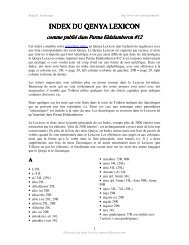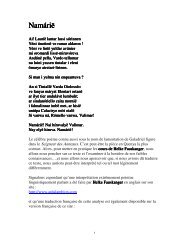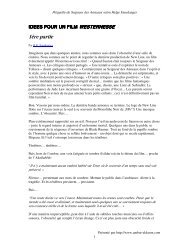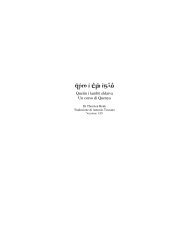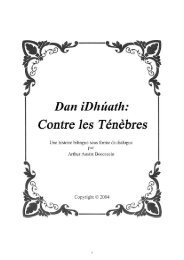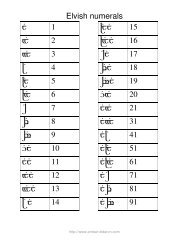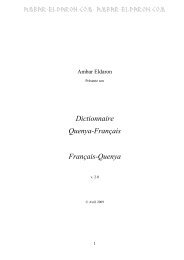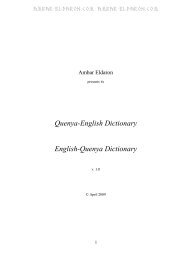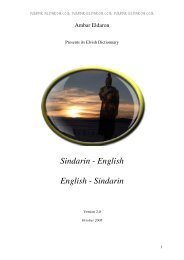Quenya Reverse Wordlist - Ambar Eldaron
Quenya Reverse Wordlist - Ambar Eldaron
Quenya Reverse Wordlist - Ambar Eldaron
You also want an ePaper? Increase the reach of your titles
YUMPU automatically turns print PDFs into web optimized ePapers that Google loves.
Helge K. Fauskanger http://www.uib.no/People/hnohf/<br />
exarac caraxë ("k, ks") "jagged hedge of<br />
spikes" (KARAK)<br />
exaracleH Helcaraxë, the Grinding Ice<br />
between Araman and Middle-earth (SA; spelt<br />
"Helkarakse" in the Etymologies, stem KARAK). Cf.<br />
helca "icy, icecold".<br />
exat taxë ("ks") "nail" (TAK)<br />
exay yaxë "milch cow", also yaxi "cow" (in<br />
mature <strong>Quenya</strong>, the latter looks like a plural) (GL:36)<br />
exin nixë "frost" (WJ:417)<br />
exit tixë ("ks") "dot, tiny mark, point" (TIK)<br />
exitama amatixë ("ks") (dot or point placed<br />
above the line of writing) (TIK)<br />
exitnun nuntixë ("ks") dot or point placed<br />
below the line of writing (TIK)<br />
exol loxë ("ks") "hair" (LOK)<br />
ey ye "is" (FS); apparently replaced by ná in<br />
mature <strong>Quenya</strong>. Future tense yéva, q.v.<br />
éy yé untranslated interjection in Aragorn's<br />
exclamation when he found the sapling of the White<br />
Tree: *"yeah!"<br />
eyl -lyë 2. person sg. ending: "thou",<br />
hiruvalyë "thou shalt find" (Nam, RGEO:67)<br />
eyle elyë "even thou", emphatic 2. person sg.<br />
pronoun (Nam, RGEO:67)<br />
eyn -nyë pronominal suffix "I"; also short<br />
form -n. In utúvienyes (see tuv-)<br />
eynarah haranyë last year of a century in the<br />
Númenórean calendar (Appendix D)<br />
eynas sanyë (Þ) "rule, law" (STAN)<br />
eynecapa apacenyë is translated "foresight"<br />
in MR:216; yet the context and the form of the word<br />
itself clearly indicates that it is actually the pl. form of<br />
an adjective *apacenya "of foresight". The noun<br />
"foresight" is almost certainly *apacen; cf. tercen<br />
"insight". (MR:216) The literal meaning of *apacen<br />
is *"aftersight", sc. knowledge of that which comes<br />
after. [Essi] apacenyë "[names] of foresight",<br />
prophetic names given to a child by its mother<br />
(MR:216)<br />
eyneyn nyenyë "weeping" (LT1:262)<br />
eynis sinyë (Þ) "evening" (THIN)<br />
eynivraN Narvinyë first month of the year,<br />
"January". The word seems to mean "New Fire/Sun".<br />
(Appendix D)<br />
eyt tye "you, thee" as object (LR:70, Arct)<br />
eyú úyë a verb occurring in Fíriel's Song,<br />
apparently ye "is" with the negative prefix ú-, hence<br />
"is not" (úyë sérë indo-ninya símen, translated "my<br />
hearth resteth not here", literally evidently *"[there] is<br />
not rest [for] my heart here")<br />
ezá ázë see árë<br />
gnef feng- "reed" (GL:34). Some final vowel<br />
would obviously be required. Use rather liscë.<br />
i i "the", indeclinable definite article (I,<br />
Nam, RGEO:67, Markirya, WJ:369, WJ:398,<br />
39<br />
MC:215, 216, 221; directly prefixed i- in i-mar [FS],<br />
i-Ciryamo [UT:8] and i-aldar *"the trees"<br />
[Narqelion]; with no hyphen in icilyanna = i<br />
cilyanna in SD:247). Also relative pronoun: i "the<br />
one/they who" (both article and relative pronoun in<br />
CO: i Eru i or ilyë mahalmar ëa: the One who is<br />
above all thrones", i hárar "they who are sitting").<br />
Note that before a verb, i means "the one who", or, in<br />
the case of a plural verb, "those who"; cf. also i carir<br />
quettar ómainen "those who form words with<br />
voices" (WJ:391).<br />
i -i nominative plural ending regularly used<br />
on nouns ending in a consonant and in -ë (except as a<br />
part of -ië); in the latter case, -ë is displaced (Quendë<br />
pl. Quendi).<br />
ia ai! interjection "Ah!", "Alas!" (Nam,<br />
RGEO:66; also twice in Narqelion, untranslated.)<br />
iadlis sildai ??? (Narqelion)<br />
ian nai (1) "be it that", used with a future<br />
tense-verb to express a wish. The translation "maybe"<br />
in Tolkien's rendering of Namárië is somewhat<br />
misleading; he used "be it that" in the interlinear<br />
translation in RGEO:67. Nai hiruvalyë Valimar! Nai<br />
elyë hiruva! *"May thou find Valimar. May even<br />
thou find it!" (Nam). Nai tiruvantes "be it that they<br />
will guard it" > "may they guard it" (CO)<br />
ian nai (2) "alas" (NAY; may be obsoleted<br />
by # 1 above - in mature <strong>Quenya</strong>, ai is to be<br />
preferred)<br />
ianilam malinai ??? (Narqelion)<br />
iarabmaenrac carneambarai ("k") "red-???"<br />
(Narqelion; very early "Qenya")<br />
iavuluc culuvai ("k") ??? (Narqelion)<br />
iaw wai (what the primitive element wei<br />
"wind, weave" became in <strong>Quenya</strong>; therefore confused<br />
with the stem WAY "enfold") (WEY)<br />
iclen nelci ("k") pl. of nelet (NÉL-EK)<br />
icran narci- ("k") "to rend" (NÁRAK)<br />
idle eldi "stars", a pl. of elen (q.v.)<br />
occasionally found in verse<br />
idlenamaÚ Úmaneldi *"Non-Aman Elves",<br />
Elves who never dwelt in Aman (= Úmanyar)<br />
(WJ:373). Sg. #Úmanel, #Úmaneld-.<br />
idlezaO Oazeldi Vanyarin (and original)<br />
form of Oareldi; see Oarel (WJ:374)<br />
idlinnavaY Yavannildi "Followers of<br />
Yavanna" (sg. *Yavannildë), Elvish women who<br />
knew and kept the secret of the making of coimas<br />
(lembas) (PM:404)<br />
idnama amandi pl. of óman, q.v. (amandi is<br />
evidently a misreading for *omandi) (OM)<br />
idnamagnA Angamandi see Angamando<br />
(LT1:249)<br />
idneuQ Quendi "Elves" as a race (analogical<br />
sg. quendë, not much used) (WJ:361; SA:quen-/quet-<br />
Presented by http://www.ambar-eldaron.com



